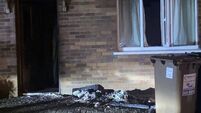External audit firms cleared of pre-crash failures

It says that the accounting and auditing standards in use at the time were “found wanting”.
Quality of the audits of the banks by the ‘Big Four’ external accounting firms has not been covered by the three official reports into Ireland’s financial crash, the world’s costliest.
But critics have often raised questions about why the web of controls over banks — including the crucial role of external auditors — failed to identify the losses mounting on the banks’ loan books as the property market started to slide rapidly.
As the loan losses mounted, taxpayers ended up injecting €64bn to keep the doors of the banks open.
The Chartered Accountants Regulatory Board, or Carb, started the review five years ago.
The review, which cost €1.33m, was led by Carb chairman and former senior civil servant Don Thornhill, and international expert David Spence.
It involved questioning and examining the audits in the financial years in 2008 or 2009 of banks that were rescued at huge expense by taxpayers. The review involved examining the world’s largest auditing firms.
It looked at the standards of the audits conducted by KPMG of Allied Irish Banks; EY’s audit of Anglo Irish; PwC’s audit of Bank of Ireland; EY’s audit of the EBS Building Society; KPMG’s audit of Irish Life & Permanent; and the audit of Irish Nationwide also conducted by KPMG.
The 80-page report does not name individual banks or auditors, but details specific audit processes in some banks at the time.
Carb said its review focused on the level of impairments for loan losses set aside by the banks as the property markets started to collapse seven years ago.
It examined whether external auditors followed the “legal, regulatory and professional standards” in the conduct of the audits in valuing the loans on the books of the banks at the time and the level of impairments reported by the banks.
Its main finding is that the so-called IAS 39 standard — an international accounting rule — was too narrow and only allowed loan loss provisions to be booked in the financial year that they occurred.
“It was found not to be satisfactory,” Mr Spence said.
He said he was satisfied that the review was “tough” on the auditors, and apart from a few less significant areas, external auditors applied the standards of the day in full.
Over five years, Carb obtained all the paper and electronic audit files. It said it thoroughly challenged the judgment calls the auditors made at the time.
It said it was prohibited by law from identifying individual banks, and from conducting “over-arching” investigations. The review was not about investigating the conduct of banks.
Asked whether Carb was the best body to conduct such a review, Mr Thornhill said that Carb was confident its review was fair and independent.
In one case, an unidentified auditing firm did not record new information. Another case involved the audit of a loan which did not record what would happen to the value of security if planning permission was not granted.
Carb said the auditors did what was expected of them, but the accounting standard applied at the time did not allow future loan losses to be taken into account.
It says that implementation of a new accounting standard “is on the horizon”, which will include providing for estimates of future loan losses.















